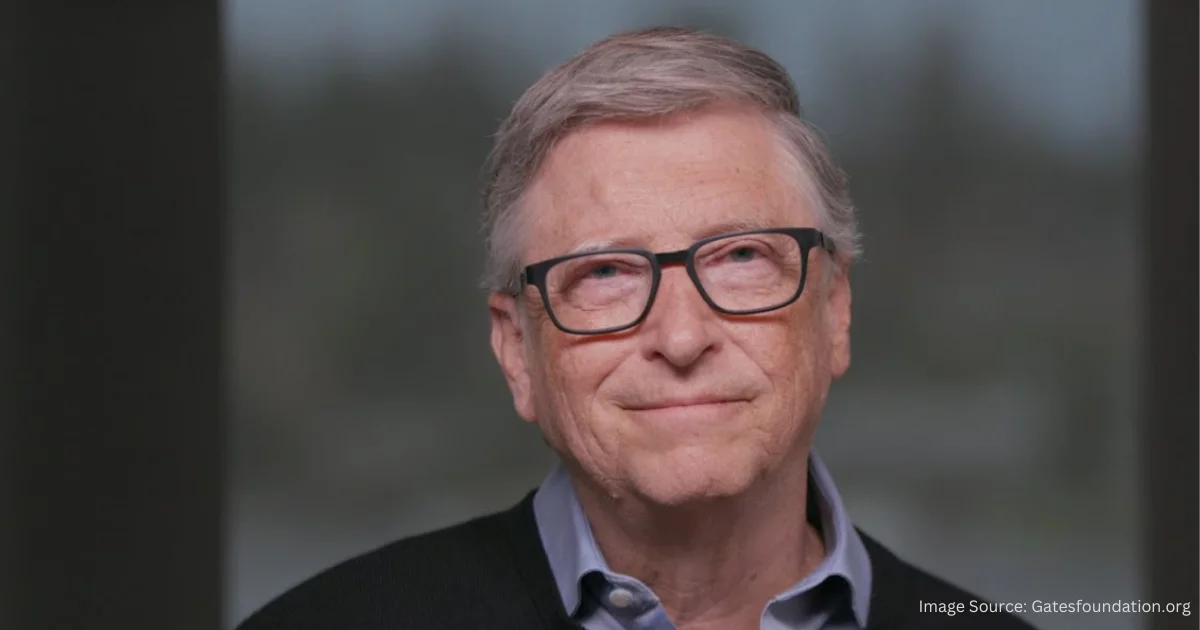Top 10 Lessons We Can Learn from Bill Gates
Bill Gates, a luminary in the world of business and technology, has left an indelible mark on the fabric of…

Bill Gates, a luminary in the world of business and technology, has left an indelible mark on the fabric of modern commerce and philanthropy. His journey, from a tech-savvy student to co-founding Microsoft and becoming one of the wealthiest individuals globally, is laden with lessons. Here, we distill his rich life into ten compelling lessons that can inspire anyone, whether they’re starting a venture or merely looking for guidance in their professional journey.
Here Are 10 Lessons You Can Learn From Bill Gates (with Examples):
1. Anticipate the Future
One of the hallmarks of Gates’s success was his uncanny ability to see beyond the present. The digital landscape is constantly evolving, and to stay afloat, it’s crucial to anticipate these changes. Gates’s foresight ensured Microsoft always remained ahead of the curve, and this principle holds for any endeavor.
Example: Gates released “The Road Ahead” in 1995, predicting the surge of the internet and envisioning transformative technological advancements, which subsequently became a reality. This visionary approach also influenced Microsoft’s early investment in operating systems, creating a cornerstone for the digital era.
2. Cherish Every Moment
Gates has emphasized that our most irreplaceable resource is time. With all his wealth, even he cannot purchase more of it. Thus, it’s imperative to be judicious with our time, making every moment count, whether in business or personal life.
Example: Gates is known for meticulously managing his time, even breaking his schedules into five-minute blocks to optimize productivity. This granular approach to time management has often been credited for his ability to manage a sprawling empire effectively.
3. Embrace Rapid Innovation

The tech world is synonymous with rapid change, and Gates’s success can be attributed to his relentless pursuit of innovation. To thrive in any competitive market, continuous adaptation and willingness to evolve are non-negotiable. As Gates highlighted, it’s not just about technology but fostering a culture that values swift action.
Example: The launch of Windows 95 was pivotal, offering a groundbreaking user interface and functionalities, and Microsoft didn’t rest on its laurels. Subsequent versions introduced web integration, touch capabilities, and more, illustrating continuous and fast-paced innovation.
4. Venture Beyond the Known
The realm of extraordinary success lies outside the comfort zone. Gates plunged into uncharted territory with computer software, and the rest is history. Embracing risk and exploring the unknown often leads to the most profound rewards.
Example: When IBM approached Microsoft for an operating system in August 1981, Gates didn’t hesitate to venture into unknown territories, purchasing and developing what became MS-DOS. This risk significantly accelerated Microsoft’s trajectory in software development.
5. Failures Are Stepping Stones
Every setback hides a lesson. Gates has consistently promoted the idea that mistakes are not dead-ends but guideposts. As he once mentioned, celebrating successes is good, but it’s equally vital to understand and internalize the lessons failures offer.
Example: Microsoft Bob, intended to simplify user interfaces, was a notorious flop. Gates acknowledged the failure but also recognized the innovation behind it. Later elements of Bob’s interface re-emerged successfully in Microsoft Office Assistant.
6. The Power of Tenacity
Gates’s journey was punctuated by challenges, but his unwavering perseverance stood out. His enduring spirit, lauded even by his co-founder Paul Allen, signifies that persistence, often more than brilliance, charts the course to success.
Example: In the initial stages, Microsoft faced fierce competition and multiple challenges, including legal battles and market pressures. Gates, however, remained resolute, navigating through challenges to maintain a dominant market position.
7. Tune into Dissenters
While accolades are great morale boosters, Gates believes in the transformative power of feedback, especially from the naysayers. Listening to unhappy customers or critics provides invaluable insights, often leading to improvements that one hadn’t even considered.
Example: After releasing Windows 8 and receiving feedback about its complexity and dual nature, Microsoft listened. The successor, Windows 10, amalgamated user feedback, providing a more user-friendly interface and experience, and showcasing adaptive change.
8. Unyielding Spirit
Gates’s first venture, Traf-O-Data, was far from successful. Yet, he didn’t let this setback deter him. His journey underscores the importance of resilience. In the entrepreneurial world, setbacks are frequent, but the key is to rise, recalibrate, and move forward.
Example: Gates’s first company, Traf-O-Data, aimed to process traffic data but ultimately folded. Despite this, Gates and Paul Allen took their learnings to a new venture, leading to the creation of Microsoft and eventual global success.
9. Lifelong Learning
Gates is a voracious reader, often delving into diverse subjects. His insatiable curiosity and dedication to learning underscore the importance of continuous personal and professional growth.
Example: Even at the peak of his career, Gates pursued learning, engaging in “Think Weeks,” where he’d isolate himself to read and ponder on numerous papers and books, demonstrating how continuous learning is integral to maintaining innovation and leadership.
10. Philanthropy Matters

Beyond his business acumen, Gates’s commitment to philanthropy, through the Bill & Melinda Gates Foundation, teaches us the value of giving back. Success is sweeter when shared, and Gates exemplifies how one can leverage their resources and influence for the greater good.
Example: The Bill & Melinda Gates Foundation, arguably one of the largest private foundations globally, reflects Gates’s commitment to utilizing wealth for global challenges. From fighting malaria to enhancing education, his philanthropic efforts showcase how success transcends beyond personal gains.
Conclusion
Bill Gates’s experiences, from monumental successes to insightful failures, are not just about building a tech empire but also about vision, resilience, learning, and giving back, offering invaluable lessons for entrepreneurs and individuals alike.

